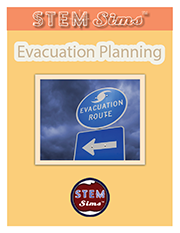What is an evacuation?
The National Response Plan defines an evacuation as "An organized, phased, and supervised withdrawal, dispersal, or removal of civilians from dangerous or potentially dangerous areas." It also notes that an evacuation includes the reception and care of the evacuees in safe areas.
What kind of event might warrant an evacuation?
There are many incidents that could require an evacuation. These include natural disasters such as hurricanes, floods, tornadoes and earthquakes, along with other incidents such as terrorist attacks, chemical or biological attacks, or unstable conditions at a nuclear facility.
Who orders evacuations?
Generally state and local governments issue evacuation orders. They may issue a voluntary evacuation order which means that it is suggested that residents evacuate but are not required to. They can also issue a mandatory evacuation order which means that everyone must evacuate. State and local governments are responsible for enacting their own laws concerning evacuations and creating evacuation routes.
Who provides relief in the event of an incident that requires an evacuation?
State and local governments are responsible for providing evacuation plans such as who is evacuated when, and where they should go. The state and local governments are responsible for emergency services including fire, police and EMS. In times of disaster the governor can assume extra powers to regulate things such as evacuation routes, directing law enforcement, or establishing a curfew.
When does the federal government get involved in disaster relief?
If the disaster requires more resources than the state can provide, the governor can ask the president to declare a state of emergency. This means that federal groups such as the Federal Emergency Management Agency (FEMA) and resources can be used to help respond to the disaster. The federal government helps coordinate decisions, supports search and rescue operations, and provides technical assistance. The federal government also provides public health support. The Red Cross works with the federal government and helps provide evacuees with shelter, food, and health services.
 A hurricane is bearing down on the region where you’re the emergency planning manager. It’s up to you to decide when and how to evacuate the citizens from your area. Should you close roads? Do local retailers have enough gasoline on hand for the increased traffic load? When should you close bridges? Should you keep law enforcement in place throughout the hurricane or should you send them out of the area for their own safety? Tough decisions lie ahead...and many people are waiting for your direction.
A hurricane is bearing down on the region where you’re the emergency planning manager. It’s up to you to decide when and how to evacuate the citizens from your area. Should you close roads? Do local retailers have enough gasoline on hand for the increased traffic load? When should you close bridges? Should you keep law enforcement in place throughout the hurricane or should you send them out of the area for their own safety? Tough decisions lie ahead...and many people are waiting for your direction.

